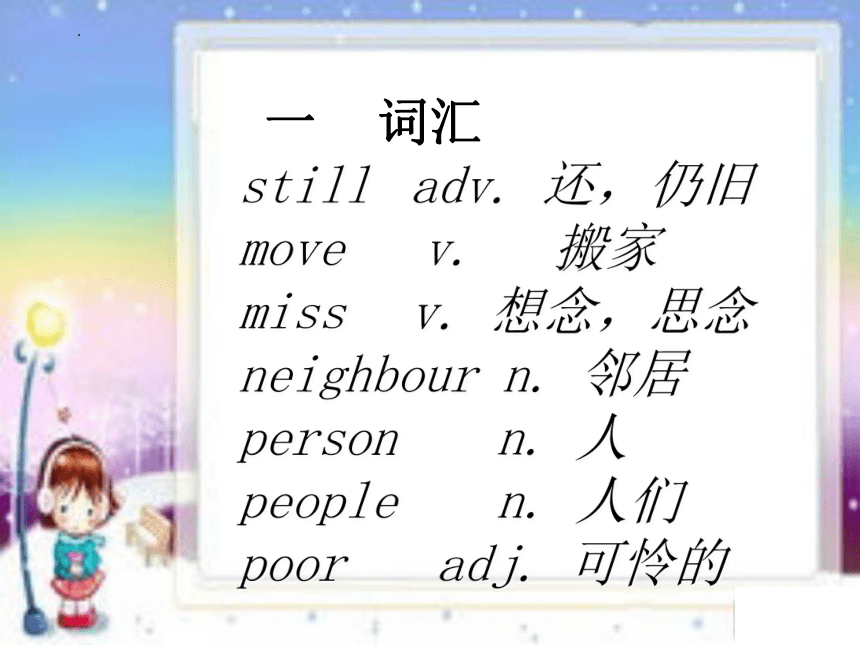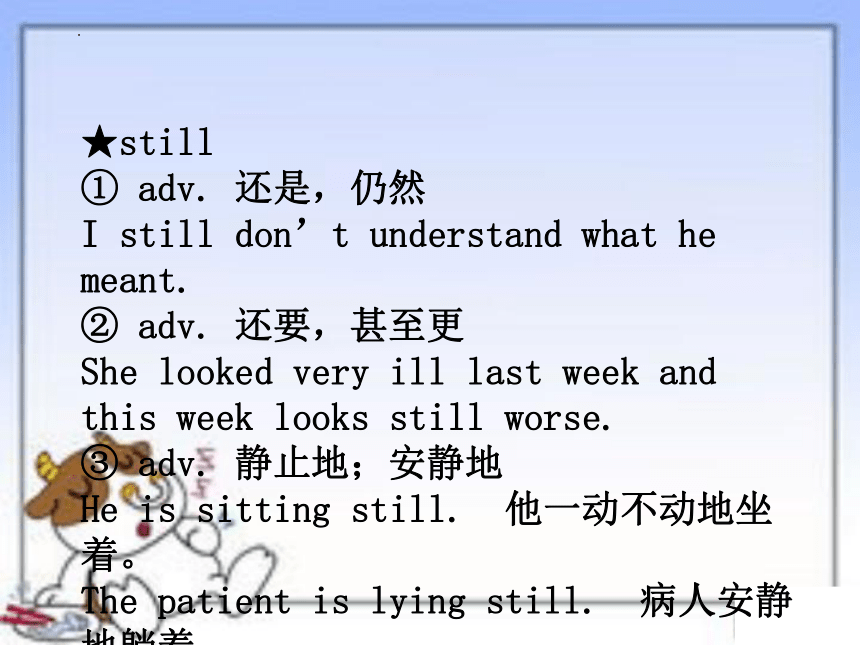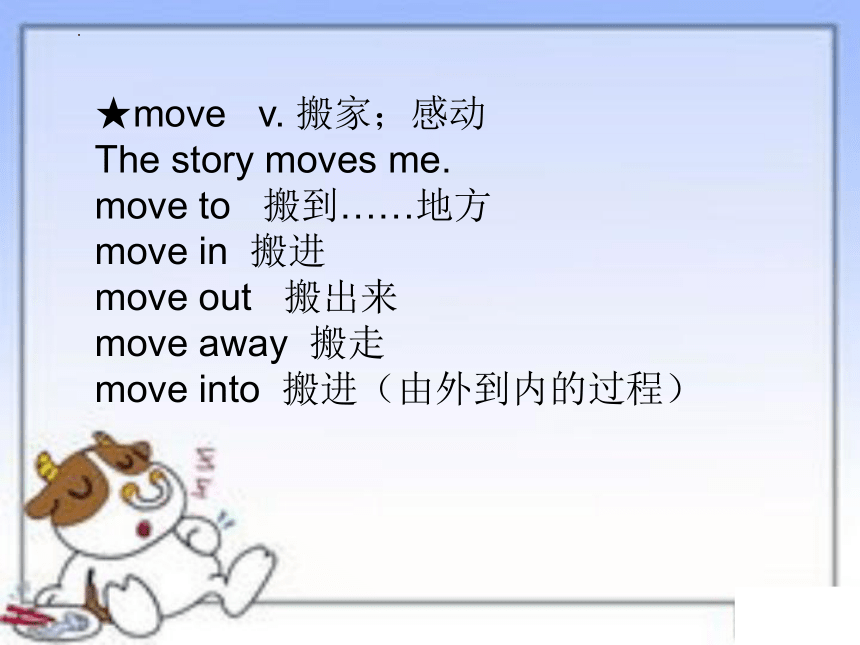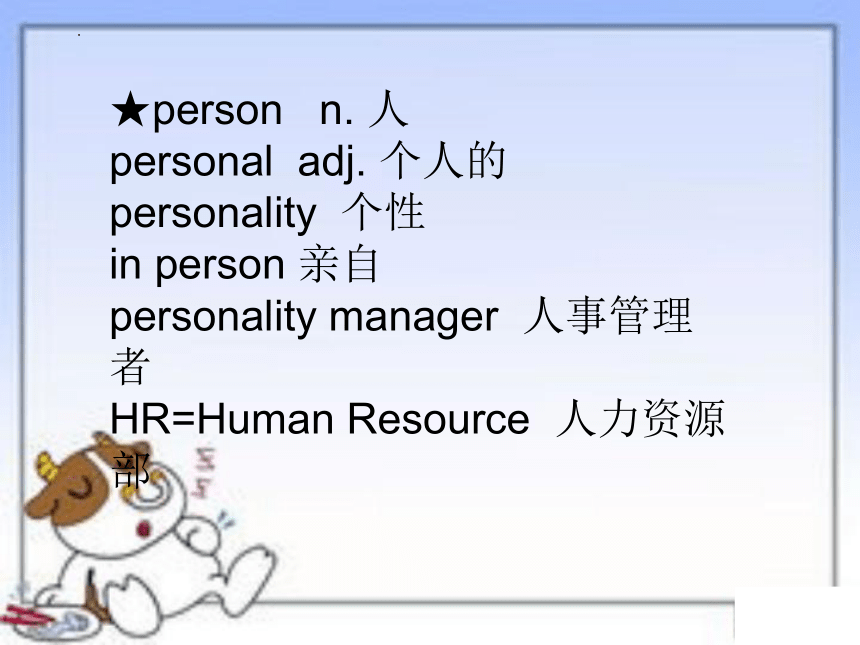新概念英语第一册Lesson91-92课件(共18张PPT)
文档属性
| 名称 | 新概念英语第一册Lesson91-92课件(共18张PPT) |  | |
| 格式 | pptx | ||
| 文件大小 | 143.8KB | ||
| 资源类型 | 教案 | ||
| 版本资源 | 新概念英语 | ||
| 科目 | 英语 | ||
| 更新时间 | 2023-10-18 19:23:50 | ||
图片预览







文档简介
(共18张PPT)
Poor lan
可怜的伊恩
一 词汇
still adv. 还,仍旧
move v. 搬家
miss v. 想念,思念
neighbour n. 邻居
person n. 人
people n. 人们
poor adj. 可怜的
★still
① adv. 还是,仍然
I still don’t understand what he meant.
② adv. 还要,甚至更
She looked very ill last week and this week looks still worse.
③ adv. 静止地;安静地
He is sitting still. 他一动不动地坐着。
The patient is lying still. 病人安静地躺着
★move v. 搬家;感动
The story moves me.
move to 搬到……地方
move in 搬进
move out 搬出来
move away 搬走
move into 搬进(由外到内的过程)
★miss v. 想念,思念
① v. 想念,惦念
② v. 错过;未做到
He overslept and missed his train. 他睡过了头,错过了他那班火车。
I missed an opportunity of realizing my dream.
我错过了一个可能实现自己梦想的机会。
★person n. 人
personal adj. 个人的
personality 个性
in person 亲自
personality manager 人事管理者
HR=Human Resource 人力资源部
★people n. 人们(无单复数变化)
ten people 十个人
二 语法
一般将来时
1)概念:将来要发生或打算(做)的事情
I will do my homework tomorrow.
I will finish my work next week.
2)时间状语:tomorrow,the day after tomorrow,in the future,soon,next+一段时间,in +一段时间(一段时间以后)等等。
3)结构:
肯定:主+ will +V原
否定:主+ won’t +V原
一般疑问句:Will +主 +V原
回答:Yes, 主 +will.
No, 主+won’t.
特殊疑问句:
特殊疑问词 + will +主语 + do +其他?
第一人称 I/we shall +V原
will not=won't
shall not =shan’t
反义疑问句
You can’t swim, can you
你不会游泳, 是吗?
It’s so hot, isn’t it
真热啊, 不是吗?
Our teacher is nice, isn’t she
我们老师真好啊, 不是吗?
↓ ↓
前句 后句
陈述句 疑问句
两大原则:前肯后否,前否后肯
前句中有否定词(no, never, hardly, few, little, nothing, nobody, seldom等)时,后句用肯定
若前句没有be动词,助动词,情态动词,则后句借用do,does,did
反义疑问句
You’re a student, aren’t you
Yes, I am.
No, I’m not.
You aren’t a student, are you
Yes, I am.
(不,我是一个学生。)
No, I’m not.
(是的,我不是学生。)
He didn’t go to school, did he
他没有去上学,是吗?
No, he didn’t.
是的, 他没去。
Yes, he did.
不,他去了。
回答按实际情况作答,翻译时yes和no与本意相反
三 课文
CATHERING:Has Ian sold his house yet
JENNY:Yes, he has. He sold it last week.
CATHERING:Has he moved to his new house yet
JENNY:No, not yet. He's still here.
He's going to move tomorrow.
CATHERING:When Tomorrow morning?
JENNY: No. Tomorrow afternoon. I'll miss him.He has always been a good neighbour.
LIDA:He's a very nice person.
We'll all miss him.
CATHERING:When will the new people move into
this house
JENNY:I think that they'll move in the day after tomorrow.
LINDA:Will you see Ian today, Jenny
JENNY:Yes, I will.
LINDA:Please give him my regards.
CATHERING:Poor Ian!
He didn't want to leave this house.
JENNY:No, he didn't want to leave, but his wife did!
1.We'll all miss him. 我们大家都会想念他的。
all,大家,全部,指3个或3个以上的人或物;指两个用both。这里的all作we的同位语。
2.…but his wife did.……可是他妻子离开。
句中 did代替上文中的 wanted to leave。
语法 Grammar in use
一般将来时
(1)一般将来时表示将来某一时刻的动作、状态以及打算。该时态一般与表示将来意义的时间状语连用,如tomorrow(明天),this month(本月), the day after tomorrow(后天),next week (下周), in two days' time(两天之后), from now on(从现在起),in the future(将来)等。
(2)一般将来时的形式为 will/shall+ 动词原形。
will可用于所有人称,但shall仅表示单纯将来时用于第一人称I和we,作为will的一种替代形式。
否定缩写: shan't =shall not, won't =will not:
I shan't leave tonight. I'll leave tomorrow. 今天夜里我不走。我将于明天离开。
They won't go to London this weekend. 这个周末他们不去伦敦。
此外,will除了表示纯粹的将来时间外,还表示说话人的意图和意愿,而shall除了表示将来时间外同时还表示说话人的责任或决心。
(3)除了will/shall外,还可以用其他方法表示将来。在口语中,be going to比 will/shall更为普通,用来表示说话人的意图或打算。
如:
She is going to travel by air. 她打算乘飞机旅行。
也可用来表示有迹象某事即将发生。如:
It's going to rain. 将要下雨了。
(4)可与将来时连用的时间短语有:
今天:
this morning/afternoon/evening今天上午/下午/晚上tonight今夜
明天:
tomorrow morning/ afternoon/evening明天上午/下午/晚上
后天:
the day after tomorrow后天 the night after next后天夜里
其他:
in the morning在上午
in the afternoon 在下午
in the evening在晚上
听一遍课文,翻译一遍
【课文翻译】
凯瑟琳:伊恩已指他的房子卖掉了吗?
詹 尼:是的,卖掉了。他上星期卖掉的。
凯瑟琳:他已经迁进新居了吗?
詹 尼:不,还没有。他仍在这里。他打算明天搬家。
凯瑟琳:什么时候?明天上午吗?
詹 尼:不,明天下午。我会想念他的。他一直是个好居。
琳 达:他是个非常好的人,我们大家都会想念他的。
凯瑟琳:新住户什么时候搬进这所房子?
詹 尼:我想他们将会在后天搬进来吧。
琳 达:詹尼,您今天会见到伊恩吗?
詹 尼:是的,我会见到他。
琳 达:请代我问候他。
凯瑟琳:可怜的伊恩!他本不想离开这幢房子。
詹 尼:是啊,他是不想离开,可是他妻子要离开。
Thank you!
Goodbuy!
Poor lan
可怜的伊恩
一 词汇
still adv. 还,仍旧
move v. 搬家
miss v. 想念,思念
neighbour n. 邻居
person n. 人
people n. 人们
poor adj. 可怜的
★still
① adv. 还是,仍然
I still don’t understand what he meant.
② adv. 还要,甚至更
She looked very ill last week and this week looks still worse.
③ adv. 静止地;安静地
He is sitting still. 他一动不动地坐着。
The patient is lying still. 病人安静地躺着
★move v. 搬家;感动
The story moves me.
move to 搬到……地方
move in 搬进
move out 搬出来
move away 搬走
move into 搬进(由外到内的过程)
★miss v. 想念,思念
① v. 想念,惦念
② v. 错过;未做到
He overslept and missed his train. 他睡过了头,错过了他那班火车。
I missed an opportunity of realizing my dream.
我错过了一个可能实现自己梦想的机会。
★person n. 人
personal adj. 个人的
personality 个性
in person 亲自
personality manager 人事管理者
HR=Human Resource 人力资源部
★people n. 人们(无单复数变化)
ten people 十个人
二 语法
一般将来时
1)概念:将来要发生或打算(做)的事情
I will do my homework tomorrow.
I will finish my work next week.
2)时间状语:tomorrow,the day after tomorrow,in the future,soon,next+一段时间,in +一段时间(一段时间以后)等等。
3)结构:
肯定:主+ will +V原
否定:主+ won’t +V原
一般疑问句:Will +主 +V原
回答:Yes, 主 +will.
No, 主+won’t.
特殊疑问句:
特殊疑问词 + will +主语 + do +其他?
第一人称 I/we shall +V原
will not=won't
shall not =shan’t
反义疑问句
You can’t swim, can you
你不会游泳, 是吗?
It’s so hot, isn’t it
真热啊, 不是吗?
Our teacher is nice, isn’t she
我们老师真好啊, 不是吗?
↓ ↓
前句 后句
陈述句 疑问句
两大原则:前肯后否,前否后肯
前句中有否定词(no, never, hardly, few, little, nothing, nobody, seldom等)时,后句用肯定
若前句没有be动词,助动词,情态动词,则后句借用do,does,did
反义疑问句
You’re a student, aren’t you
Yes, I am.
No, I’m not.
You aren’t a student, are you
Yes, I am.
(不,我是一个学生。)
No, I’m not.
(是的,我不是学生。)
He didn’t go to school, did he
他没有去上学,是吗?
No, he didn’t.
是的, 他没去。
Yes, he did.
不,他去了。
回答按实际情况作答,翻译时yes和no与本意相反
三 课文
CATHERING:Has Ian sold his house yet
JENNY:Yes, he has. He sold it last week.
CATHERING:Has he moved to his new house yet
JENNY:No, not yet. He's still here.
He's going to move tomorrow.
CATHERING:When Tomorrow morning?
JENNY: No. Tomorrow afternoon. I'll miss him.He has always been a good neighbour.
LIDA:He's a very nice person.
We'll all miss him.
CATHERING:When will the new people move into
this house
JENNY:I think that they'll move in the day after tomorrow.
LINDA:Will you see Ian today, Jenny
JENNY:Yes, I will.
LINDA:Please give him my regards.
CATHERING:Poor Ian!
He didn't want to leave this house.
JENNY:No, he didn't want to leave, but his wife did!
1.We'll all miss him. 我们大家都会想念他的。
all,大家,全部,指3个或3个以上的人或物;指两个用both。这里的all作we的同位语。
2.…but his wife did.……可是他妻子离开。
句中 did代替上文中的 wanted to leave。
语法 Grammar in use
一般将来时
(1)一般将来时表示将来某一时刻的动作、状态以及打算。该时态一般与表示将来意义的时间状语连用,如tomorrow(明天),this month(本月), the day after tomorrow(后天),next week (下周), in two days' time(两天之后), from now on(从现在起),in the future(将来)等。
(2)一般将来时的形式为 will/shall+ 动词原形。
will可用于所有人称,但shall仅表示单纯将来时用于第一人称I和we,作为will的一种替代形式。
否定缩写: shan't =shall not, won't =will not:
I shan't leave tonight. I'll leave tomorrow. 今天夜里我不走。我将于明天离开。
They won't go to London this weekend. 这个周末他们不去伦敦。
此外,will除了表示纯粹的将来时间外,还表示说话人的意图和意愿,而shall除了表示将来时间外同时还表示说话人的责任或决心。
(3)除了will/shall外,还可以用其他方法表示将来。在口语中,be going to比 will/shall更为普通,用来表示说话人的意图或打算。
如:
She is going to travel by air. 她打算乘飞机旅行。
也可用来表示有迹象某事即将发生。如:
It's going to rain. 将要下雨了。
(4)可与将来时连用的时间短语有:
今天:
this morning/afternoon/evening今天上午/下午/晚上tonight今夜
明天:
tomorrow morning/ afternoon/evening明天上午/下午/晚上
后天:
the day after tomorrow后天 the night after next后天夜里
其他:
in the morning在上午
in the afternoon 在下午
in the evening在晚上
听一遍课文,翻译一遍
【课文翻译】
凯瑟琳:伊恩已指他的房子卖掉了吗?
詹 尼:是的,卖掉了。他上星期卖掉的。
凯瑟琳:他已经迁进新居了吗?
詹 尼:不,还没有。他仍在这里。他打算明天搬家。
凯瑟琳:什么时候?明天上午吗?
詹 尼:不,明天下午。我会想念他的。他一直是个好居。
琳 达:他是个非常好的人,我们大家都会想念他的。
凯瑟琳:新住户什么时候搬进这所房子?
詹 尼:我想他们将会在后天搬进来吧。
琳 达:詹尼,您今天会见到伊恩吗?
詹 尼:是的,我会见到他。
琳 达:请代我问候他。
凯瑟琳:可怜的伊恩!他本不想离开这幢房子。
詹 尼:是啊,他是不想离开,可是他妻子要离开。
Thank you!
Goodbuy!
同课章节目录
